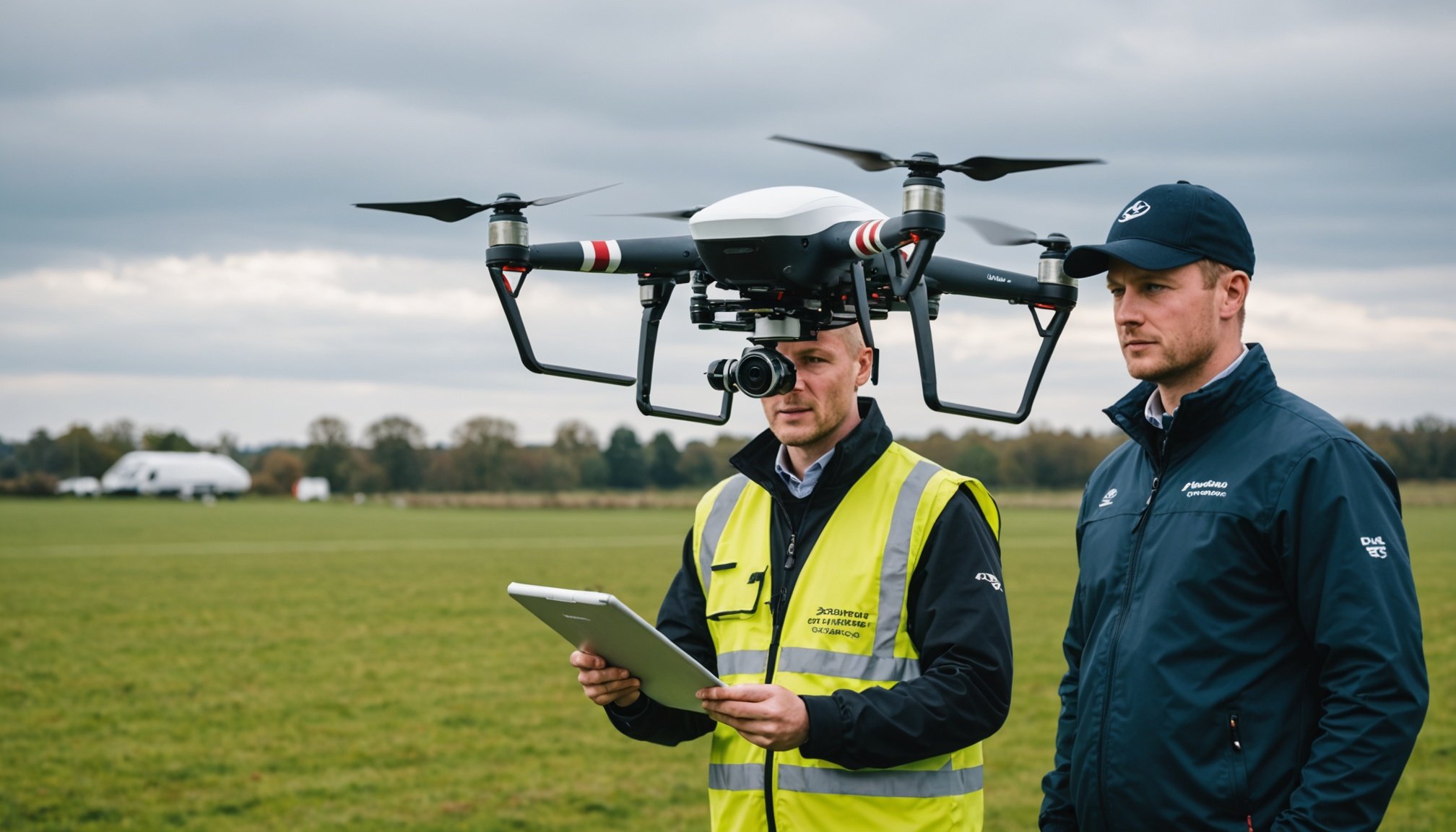Overview of the UK Drone Delivery Business Landscape
The drone delivery industry in the UK is experiencing rapid growth, influenced by evolving technology and consumer demand. Presently, several trends highlight the integration of drones in logistics, such as their use in remote parcel deliveries and as a sustainable solution to urban congestion.
An essential aspect of thriving in this business is adherence to UK Aviation Regulations. Compliance ensures safe operations both for individuals and property, minimizing legal hurdles and promoting trust with stakeholders. These regulations influence everything from flight paths to emergency protocols, requiring operators to stay informed and proactive in their safety measures.
Topic to read : How to Start Your Own UK Organic Skincare Line: The Ultimate Step-by-Step Guide
Several key players have emerged within the UK drone delivery sector. Established companies with significant market presence include Zipline, known for pioneering medical deliveries; and Amazon Prime Air, which is testing and expanding short-distance deliveries. Their success often hinges on their ability to navigate the complex regulatory environment while innovatively leveraging drone technology.
Overall, the industry appears poised for continued growth, provided that companies remain vigilant in maintaining compliance. Embracing aviation safety is crucial not only for operational success but for enhancing public confidence in drone technologies as a viable delivery service.
This might interest you : Unlocking Success: The Ultimate UK Luxury Watch Retailer’s Guide to Mastering Import Regulations
Legal Framework for Drone Operations
Understanding the drone legislation in the UK is fundamental for any business operating or considering to operate drone delivery services. The UK Aviation Law provides a comprehensive framework that governs the use of drones, ensuring safety and legal compliance. The Civil Aviation Authority (CAA) plays a pivotal role in crafting and enforcing these regulations. They are responsible for setting standards and offering guidance for safe drone operations.
Drone operators must obtain the necessary certifications and licences to conduct operations legally within the UK. The process typically involves proving your knowledge and understanding of the regulations, as well as demonstrating the ability to operate drones safely. Operators are also required to conduct risk assessments and adhere to specific aviation safety compliance protocols.
The CAA’s stringent guidelines aim to proactively manage risks and maintain high compliance standards. By keeping abreast of evolving laws and maintaining open communication with regulatory authorities, businesses can ensure their operations are not only lawful but well-positioned in the burgeoning drone delivery market. Engaging regularly with the CAA and staying informed about changes in legislation is essential for sustained success and innovation in drone operations.
Aviation Safety Compliance Requirements
Maintaining aviation safety compliance is paramount for all drone delivery operations in the UK. Operators need to adhere to stringent compliance standards outlining safety protocols and risk assessments. These measures are designed to ensure both the safety of the airspace and public confidence in drone technologies.
Safety Protocols involve routine procedures that must be followed meticulously by operators. This includes pre-flight checks, regular maintenance, and ensuring drones meet the required airworthiness standards. Conducting thorough risk assessments is essential before any operation, helping identify potential hazards and implement preventive actions.
Operational safety management also relies heavily on keeping drones in optimal condition. This involves not only regular technical checks but also staying updated with the latest aviation safety developments. Up-to-date knowledge enables operators to maintain high standards and adapt operations when necessary.
Equipment standards play a significant role in compliance, ensuring that all flying machinery is fit for purpose. Ensuring airworthiness involves evaluating factors such as battery life, sensor functionality, and software systems. By prioritising compliance standards, operators can mitigate risks and contribute to the industry’s reputation for safety and reliability. Overall, adherence to these requirements is not just about legality; it is about ensuring a trustworthy and safe service for all.
Compliance Checklists and Best Practices
Implementing thorough compliance checklists is crucial to ensuring successful and safe drone operations. These checklists serve as a structured guide for operators, mitigating errors and enhancing safety.
Pre-Operational Checklists
Before takeoff, operators should conduct extensive checks on equipment and safety measures. This includes verifying drone condition, battery levels, and software updates. Risk assessments help identify potential issues, allowing for preventive measures. Completing these checks not only ensures operational integrity but also establishes a routine that aids in compliance.
In-Flight Compliance Procedures
During flight, vigilance is key. Operators must monitor drone performance and maintain adherence to aviation regulations, such as staying within approved airspace and altitudes. Continuous monitoring and adjustments, as necessary, safeguard both the drone and public safety.
Post-Operational Reporting
After completion of a flight, detailed reporting is essential. Documentation of the drone’s performance, any incidents, and maintenance needs enables continuous improvement and accountability.
Establishing a culture of compliance involves routine audits, training updates, and embracing best practices. Robust record-keeping further supports operators in demonstrating their commitment to regulations, enhancing trust with stakeholders and regulatory bodies.
Engaging with Regulatory Bodies
In the dynamic drone delivery sector, building a harmonious relationship with regulatory bodies is essential. Effective communication with authorities, such as the Civil Aviation Authority (CAA), ensures operations align with current UK Aviation Regulations. Regular interaction helps businesses adapt quickly to legislative changes, thus maintaining consistent regulatory compliance.
Operators should establish structured pathways for dialogue with regulatory forces. This can involve scheduled briefings or participating in industry working groups. Staying abreast of updates through official channels facilitates early adoption of new rules, reducing the risk of non-compliance.
Engagement also extends to taking advantage of resources for industry support and networking. Trade associations and forums can offer invaluable insights into best practices, allowing operators to benchmark their compliance efforts effectively. These platforms provide opportunities for knowledge exchange, driving innovation and improvement in compliance strategies.
Furthermore, leveraging resources such as compliance toolkits or online portals provided by the CAA can enhance understanding and execution of safety standards. Continuous education through workshops and seminars ensures operators remain informed about advancements in drone technologies and legislative shifts. In turn, this proactive stance bolsters trust with regulatory bodies, fostering a more responsive and compliant drone delivery ecosystem.
Real-World Case Studies
Exploring real-world case studies in the UK drone delivery sector can illuminate the path for new entrants and established players alike. These case studies provide insights into the operational nuances, achievements, and obstacles faced by pioneering companies.
For instance, Zipline has successfully demonstrated its capability in medical supply delivery, revolutionizing access to essential health products through precise and efficient aerial logistics. Their case underscores the importance of agile navigation within the UK Aviation Regulations framework, coupled with strategic geographical mapping to optimise delivery routes.
Similarly, Amazon Prime Air exemplifies innovation in short-distance commercial deliveries. They’ve leveraged advanced drone technology and compliance with UK legislation to expand their service footprint effectively. Their journey accentuates the critical need for aviation safety compliance measures like rigorous pre-flight checks and ongoing software updates to maintain operational integrity.
These success stories reflect key lessons learned: the necessity of robust compliance standards, continuous adaptation to legislative changes, and investing in cutting-edge technology. Challenges often arise in aligning with stringent safety protocols, which require significant resource allocation but ultimately yield trust and expansion opportunities.
Embracing such innovative practices positions businesses competitively while enhancing public perception of drone technologies as reliable and future-forward delivery solutions.
Resources and Further Reading
For those involved in the drone delivery industry, staying informed and educated is paramount to success. Expanding your knowledge base can help operators not just navigate regulations but also spearhead innovation within the sector.
Recommended Publications and Websites
Engaging with credible sources can provide insights into the evolving landscape. Publications such as the “Journal of Unmanned Vehicle Systems” offer in-depth analysis on drone technology and aviation safety. Websites like the UK Civil Aviation Authority’s portal are valuable for accessing up-to-date UK Aviation Regulations and guidance.
Key Organizations and Associations
Associating with established entities enhances understanding and offers networking opportunities. The Drone Industry Association of the UK acts as a crucial hub for policy updates and industry best practices. Membership in such organizations ensures alignment with compliance standards while offering avenues for collaborative growth.
Online Courses and Certification Programs
Ongoing education through online platforms is critical. Courses focusing on drone legislation and UK Aviation Law are vital for grasping regulatory nuances. Programs hosted by recognized bodies, like the Open University, can fortify one’s expertise, ensuring that operators not only meet but exceed compliance standards.
Leveraging these resources empowers operators to stay ahead in an increasingly competitive industry, fostering innovation while ensuring legal adherence.











